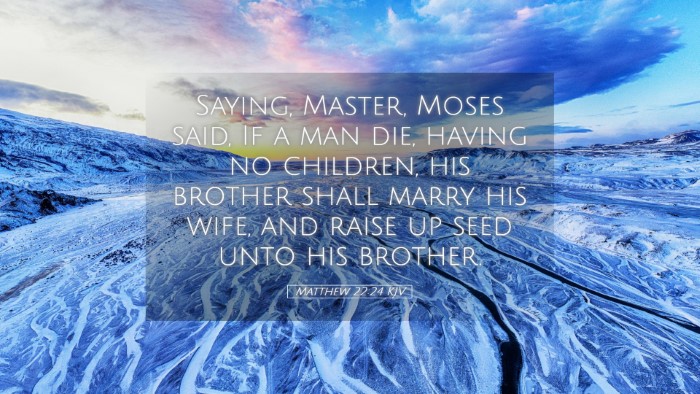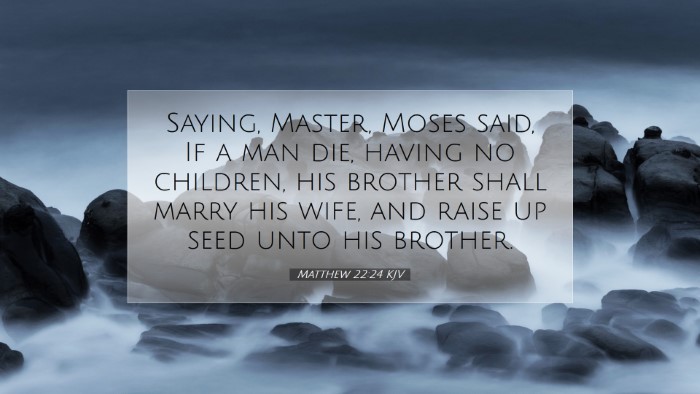Commentary on Matthew 22:24
In this verse, we encounter a challenge posed to Jesus by the Sadducees, a group known for their strict literal interpretation of the Scriptures and their denial of the resurrection. This passage not only opens up a significant theological discourse but also demonstrates the wisdom of Christ in handling complex questions regarding life after death.
Contextual Analysis
The context of this verse is essential for understanding the interplay between Jesus and the religious leaders of His time. The Sadducees, seeking to undermine Jesus’ authority, presented Him with a hypothetical scenario regarding the resurrection of the dead:
- The Challenge of the Sadducees: They were skeptical about life after death, claiming that Moses’ law concerning levirate marriage (Deuteronomy 25:5-10) would create a conflict for a woman married to multiple brothers in the resurrection.
- Their Intent: Their goal was to trap Jesus into making a statement that would contradict either His teachings or the Jewish law, thus discrediting Him in front of the masses.
Theological Implications
This verse prompts an exploration of several key theological themes:
- The Resurrection: The debate about resurrection is crucial, for it highlights a core aspect of Christian doctrine. The Sadducees’ denial reflects a critical misunderstanding of Scripture and God’s power.
- Marriage and Eternity: The question about the marital status of individuals in the resurrection indicates the limitations of human understanding regarding heavenly realities.
- Authority of Scripture: Jesus’ response emphasizes the importance of Scripture, showing that proper interpretation reveals the truth of God’s promises concerning life after death.
Insights from Public Domain Commentaries
Several commentators provide rich insights into this verse:
- Matthew Henry: Henry emphasizes the folly of the Sadducees in attempting to challenge divine truth. He remarks on the importance of understanding Biblical law in the spirit rather than merely in the letter. Human traditions and interpretations can often lead to errors in understanding God’s will.
- Albert Barnes: Barnes notes that the Sadducees' argument was a poor reflection of their understanding. He stresses that Jesus uses their own Scriptures to refute their claims, showing that they were ignorant of both the Scriptures and the power of God. Barnes points out that the resurrection is a core truth of the faith that transcends earthly concerns.
- Adam Clarke: Clarke draws attention to how the argument shows the necessity of a direct relationship with God. He highlights that the resurrection is not merely a theological idea but a transformative reality that shapes believers' understanding of life and death. Clarke emphasizes the hope that comes from understanding resurrection as part of God's divine plan.
Application for Today's Believers
The implications of Matthew 22:24 extend beyond mere theological debate. Today's believers can glean several important lessons:
- Faith in Resurrection: Christians are called to trust in the resurrection promise, which assures them of eternal life. This faith should inform how they live and interact with others.
- Caution Against Misinterpretation: The incident illustrates the potential for misunderstanding Scripture. Believers must strive for accurate interpretations, anchoring their beliefs in a thorough understanding of the Word.
- Engaging with Skepticism: Like the Sadducees, modern skeptics often present challenges to faith. Believers can learn from Jesus’ approach by engaging respectfully and using sound reasoning to discuss matters of faith.
Conclusion
In summary, Matthew 22:24 encapsulates a significant moment in Jesus’ ministry, offering profound insights into the nature of resurrection, the authority of Scripture, and the necessity of understanding God’s will. Pastors, students, and scholars alike are encouraged to reflect on these themes, drawing upon the historical and theological richness found in this passage as they apply its teachings to their lives and ministries.


